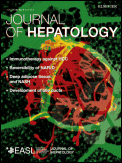
JOURNAL OF HEPATOLOGY
Scope & Guideline
Fostering Innovation in Hepatology Research
Introduction
Aims and Scopes
- Clinical Research in Hepatology:
The journal emphasizes clinical studies that provide insights into the diagnosis, treatment, and management of liver diseases, particularly chronic conditions such as hepatitis B and C, cirrhosis, and hepatocellular carcinoma. - Biomarker Discovery and Validation:
A significant focus is on identifying and validating biomarkers for liver diseases, which can aid in early diagnosis, prognosis, and monitoring treatment responses. - Pathophysiology of Liver Diseases:
The journal publishes research exploring the underlying biological mechanisms and pathophysiological changes associated with various liver diseases, contributing to a deeper understanding of disease progression. - Noninvasive Diagnostic Techniques:
There is a consistent emphasis on developing and evaluating noninvasive tools for liver assessment, such as imaging techniques and serum biomarkers, to improve patient management. - Public Health and Epidemiology:
The journal also covers studies addressing the epidemiology of liver diseases, health policies, and educational programs aimed at improving prevention and treatment outcomes in diverse populations.
Trending and Emerging
- Nonalcoholic Fatty Liver Disease (NAFLD) and Metabolic Disorders:
There is an increasing emphasis on NAFLD, particularly its progression to metabolic-associated steatohepatitis, indicating a growing recognition of the need to address liver disease within the context of metabolic health. - Impact of Aging on Liver Disease Outcomes:
Research focusing on the outcomes of liver diseases in older populations is trending, as clinicians seek to understand how age-related factors influence disease progression and treatment responses. - Integration of Technology in Liver Disease Management:
Emerging studies exploring the use of technology, including telemedicine and mobile health applications, for the management of liver diseases signify a shift towards more accessible healthcare solutions. - Multi-morbidity in Liver Disease Patients:
The intersection of liver disease with other chronic conditions, such as HIV and renal failure, is gaining attention, highlighting the complexity of managing patients with multiple health issues. - Education and Awareness Programs:
There is a growing trend towards research exploring the effectiveness of educational initiatives targeting healthcare professionals and the public to improve awareness and prevention of liver diseases.
Declining or Waning
- Traditional Invasive Procedures for Liver Assessment:
There has been a noticeable decline in studies focusing on traditional invasive techniques, such as liver biopsies, as the field increasingly prioritizes noninvasive methods for evaluating liver conditions. - Historical Case Studies:
The journal has reduced its publication of historical case studies or retrospectives that do not contribute new insights or advancements in the understanding of liver diseases. - General Hepatology Reviews:
There seems to be a waning interest in broad review articles that summarize existing knowledge without proposing new research directions or insights into future challenges in hepatology.
Similar Journals
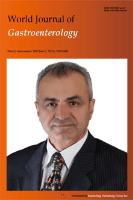
WORLD JOURNAL OF GASTROENTEROLOGY
Pioneering discoveries for better digestive health.WORLD JOURNAL OF GASTROENTEROLOGY, published by BAISHIDENG PUBLISHING GROUP INC, stands at the forefront of gastrointestinal research, providing a critical platform for the dissemination of high-quality studies in the field. With an impressive impact factor reflected in its Q1 rankings in both Gastroenterology and Miscellaneous Medicine, this journal is recognized for its rigorous peer-review process and commitment to advancing knowledge and practices related to digestive health. Covering comprehensive scopes from clinical advancements to innovative therapies, the journal serves an essential role for researchers, clinicians, and students, enabling them to stay updated on the latest developments and findings from 1998 through 2024. The open access model facilitates broader accessibility, ensuring that groundbreaking research reaches a global audience. The journal's ranking within the top 15% of Scopus demonstrates its significant contribution to the academic community, making it a valuable resource for advancing the science of gastroenterology.
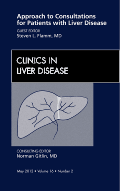
Clinics in Liver Disease
Navigating the landscape of liver health and disease.Clinics in Liver Disease is an esteemed peer-reviewed journal published by W B Saunders Co-Elsevier Inc, dedicated to advancing the field of hepatology. Established in 1997 and covering a broad range of topics within liver disease research, this journal serves as a vital resource for researchers, clinicians, and students engaged in the study of liver health and diseases. With a commendable impact factor placing it within the Q2 category in Hepatology and ranking #32 out of 82 in the Scopus classifications, it consistently disseminates high-quality research and clinical insights. The journal’s commitment to promoting understanding and management of liver diseases is reflected in its rigorous editorial standards and comprehensive review processes. Although not an open-access publication, Clinics in Liver Disease offers subscription options that ensure accessibility to up-to-date research and reviews critical for both academic and clinical success.
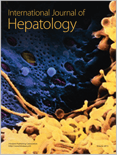
International Journal of Hepatology
Bridging research and clinical practice in hepatology.The International Journal of Hepatology, published by HINDAWI LTD, is a premier open-access journal dedicated to the field of hepatology. Since its inception, this journal has championed the dissemination of cutting-edge research and reviews pertaining to liver health, diseases, and therapies. With an ISSN of 2090-3448, the journal has been committed to open-access publishing since 2011, ensuring that vital knowledge is readily available to researchers, clinicians, and students worldwide. Based in Egypt, this journal stands out in its category, achieving a Q3 ranking in 2023 within the scope of Hepatology by Scopus, which ranks it #43 out of 82 in the field. The International Journal of Hepatology offers a platform for significant findings and discussions that influence clinical practices and foster new research directions, thus playing a crucial role in advancing the understanding of liver diseases and their management.
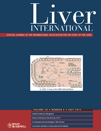
LIVER INTERNATIONAL
Transforming hepatological discourse with open access insights.LIVER INTERNATIONAL, with its ISSN 1478-3223 and E-ISSN 1478-3231, is a prestigious peer-reviewed journal published by Wiley in the United Kingdom. Established in 2003, it focuses on advancing the field of hepatology, covering a broad spectrum of topics including liver disease, hepatocellular carcinoma, and transplantation. Ranking #10 out of 82 in the Scopus category for Medicine - Hepatology and boasting a remarkable 88th percentile, LIVER INTERNATIONAL has secured its reputation as a leading journal, recognized as Q1 in the 2023 category quartiles. The journal emphasizes accessibility, offering an open access option to ensure that critical research findings reach a wider audience. By facilitating the dissemination of high-quality research, LIVER INTERNATIONAL plays a vital role in shaping contemporary hepatological discourse and bridging academic inquiry with clinical practice, making it an essential resource for researchers, healthcare professionals, and students alike.

Clinical Gastroenterology and Hepatology
Bridging Science and Practice in Digestive HealthClinical Gastroenterology and Hepatology, published by Elsevier Science Inc, stands as a leading journal in the fields of gastroenterology and hepatology. With an ISSN of 1542-3565 and an E-ISSN of 1542-7714, this esteemed publication has earned its place in the top quartile (Q1) of both gastroenterology and hepatology categories as of 2023, ranking 6th out of 167 and 7th out of 82 respectively. The journal aims to disseminate innovative research, clinical studies, and case reports that advance the understanding and treatment of gastrointestinal and liver diseases. Targeted towards researchers, healthcare professionals, and students, it provides crucial insights into emerging therapies and medical advancements. Clinical Gastroenterology and Hepatology is not only a pivotal resource for contemporary gastroenterological research but also fosters collaboration and knowledge-sharing within the medical community. With a converging publication history from 2003 to the present, the journal continues to build on its solid foundation of scientific excellence and relevance.

Hepatology Communications
Advancing liver health through innovative research.Hepatology Communications, published by Lippincott Williams & Wilkins, serves as a pioneering platform in the field of hepatology, dedicated to advancing the understanding of liver diseases and treatments. Since its inception in 2017, this open access journal has rapidly gained recognition, achieving an impressive Q1 ranking in Hepatology as of 2023, and appealing to a diverse audience of researchers, clinicians, and students alike. With its focus on high-quality research and clinical studies, the journal aims to facilitate impactful discussions and disseminate vital findings that address the challenges faced in liver health. Operating out of the United States, and accessible globally, Hepatology Communications is committed to fostering a collaborative research environment and enhancing the visibility of scholarly work in hepatology, ultimately driving forward innovations in patient care and treatment strategies.
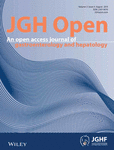
JGH Open
Empowering the Future of Gastrointestinal MedicineJGH Open is a prominent open-access journal dedicated to advancing knowledge in the fields of Gastroenterology and Hepatology, published by WILEY. Since its inception in 2017, the journal has served as a crucial platform for researchers, professionals, and students to disseminate innovative research findings and clinical insights. With an impact factor and Scopus rankings reflecting its steady growth—ranking in the 3rd quartile for both Gastroenterology (Q3) and Hepatology (Q3)—JGH Open is positioned within the competitive landscape of medicine. Its commitment to open access enhances the visibility and accessibility of high-quality research, ensuring that significant advancements in understanding diseases of the gastrointestinal tract and liver reach a broad audience. With a focus on collaboration and dissemination of knowledge, JGH Open aims to contribute to the global discourse and improve outcomes in gastrointestinal health.
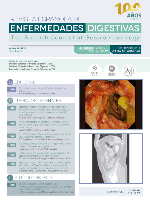
REVISTA ESPANOLA DE ENFERMEDADES DIGESTIVAS
Elevating clinical practices through open access knowledge.REVISTA ESPANOLA DE ENFERMEDADES DIGESTIVAS, a pivotal Open Access journal published by ARAN EDICIONES, S A, has been at the forefront of advancing the field of gastroenterology since its inception in 1990. With a robust commitment to disseminating high-quality research, the journal provides a platform for researchers, clinicians, and students to share innovative findings and insights concerning digestive diseases. The journal is characterized by its Q3 ranking in both Gastroenterology and Miscellaneous Medicine categories, indicative of its significant contributions to these fields, and is positioned within the 36th percentile of Scopus rankings for medicine related to gastroenterology. Based in Spain, REVISTA ESPANOLA DE ENFERMEDADES DIGESTIVAS has embraced the Open Access model since 2004, ensuring that its articles are readily available to a global audience without financial barriers. The journal not only supports academic discourse but also plays a crucial role in improving clinical practices and health outcomes related to digestive health.

Translational Gastroenterology and Hepatology
Transforming Laboratory Insights into Clinical Excellence.Translational Gastroenterology and Hepatology, published by AME Publishing Company, stands as a pivotal platform for advancing the understanding and treatment of gastrointestinal and liver diseases. With its focus on translational research, this journal aims to bridge the gap between laboratory discoveries and clinical applications, thus fostering improvements in patient care. Although specific metrics like H-Index and Scopus ranks are currently unavailable, the journal is committed to maintaining high standards of scholarly communication and excellence. As an open-access publication, it ensures that valuable findings are readily accessible to a global audience, promoting collaboration and innovation among researchers, clinicians, and healthcare professionals invested in gastroenterology and hepatology. The journal's dedication to disseminating groundbreaking research makes it an essential resource for those seeking to stay at the forefront of these ever-evolving fields.
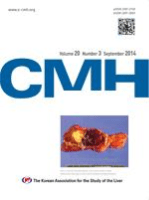
Clinical and Molecular Hepatology
Elevating understanding and treatment of liver conditions.Clinical and Molecular Hepatology, published by the Korean Association for the Study of Liver, stands at the forefront of hepatology, offering a significant platform for research and innovation in liver diseases. Established in 1995 as an open access journal, it aims to disseminate high-quality research that spans the fields of hepatology, molecular biology, and medicine. With an impressive impact factor ranking it in the Q1 category for 2023 in both Hepatology and Molecular Biology, the journal facilitates a rich exchange of knowledge among professionals, researchers, and students globally. With its dedicated coverage from 2012 to 2024 and exceptional Scopus rankings placing it within the top 10% of journals in its field, Clinical and Molecular Hepatology is an indispensable resource for advancing the understanding and treatment of liver conditions. Located in Seoul, South Korea, the journal emphasizes rigorous peer review and is committed to enhancing clinical practice and molecular research, making it an ideal venue for groundbreaking studies in liver health.